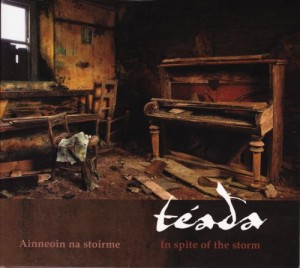 I believe the word I am looking for is “Wow.“
I believe the word I am looking for is “Wow.“
I refer to “Ainneoin na Stoirme (In Spite of the Storm),” the vibrant new CD from the Irish traditional supergroup Téada. It’s a jewel. Emerald, of course.
The band possesses a particular talent for resurrecting the great old stuff and making it seem like new stuff. A lot of bands play the old tunes with a good deal of flair, and a reverence for tradition. I probably like them all, in one way or another, for one reason or another.
Still, there’s something different and rare about Téada. The band’s world-class young musicians, led by founder Oisín Mac Diarmada on fiddle, know how to fill every corner of a room with rich, gorgeous sound. If you’ve heard them in concert, you know what I’m talking about. All the same, there’s a music box lightness and airiness to their execution of that sound that I’ve always admired.
So in that sense, “In Spite of the Storm” is more of the same. And that’s a very good thing indeed.
Now, add to the mix 2013 TG4 Traditional Singer of the Year and living legend Séamus Begley. He joined the band in March of 2012. His voice is like a branch of strong, solid mahogany, sanded down to a silky smoothness. It’s not as if Téada was ever lacking. Téada never needed anything to make it better than the already accomplished band that it is. And yet, Begley’s singing takes an already accomplished band and somehow completes it.
Begley’s singing produces many of the albums finest moments. I particularly liked the waltz “Ar A MBóithrín Buí/Tell Me Now.” Sung in Irish, it sounded like the gentlest of lullabies.
One cute little tune you won’t want to miss is Marty Robbins’ old chestnut, “Saddle Tramp.” Begley seems to delight in telling you a story, and this is a good one. You have to love the lyrics:
They call me a drifter, they say I’m no good
I’ll never amount to a thing
Well, I may be a drifter and I may be no good
There’s joy in this song that I sing
Couldn’t have said it better. Mac Diarmada might surprise you with his take on old-timey fiddling. It really makes the tune.
Of course, Mac Diarmada and his bandmates have always possessed the power to amaze. They hit the ground running with a blistering set of reels (“Dinny O’Brien’s/The Sweetheart Reel/Paddy Kenny’s”). You’ll be hanging on by your fingernails, but the boys hold the whole thing together with ease.
You’ll also a nice pairing of jigs and a slip jig, “The Jig of the Dead/I Have a House of My Own With a Chimney Built On the Top of It/Paddy Breen’s/The Bird’s Call.” Seán Mc Elwain opens the set with some terrific bouzouki licks, and he’s a key element of everything that follows, providing skilled counterpoint throughout.
Flutist Damien Stenson takes the lead on the final set, reels once again: “James Murray’s; Porthole of the Kelp/The Watchmaker/The Spinning Wheel. Very pretty.
I also have to say, I sometimes think its easy not to notice the contribution of the bodhran player. And I’m not just saying that because of my feeble attempts to play the thing. I think that’s because, if the drummer knows is business, he’s supporting the band in a very delicate, unobtrusive, but really indispensible way. It’s really not an easy act to pull off. Fair play, as the saying goes, to Tristan Rosenstock, who provides solid rhythmic backing from the beginning to the end of this 11-track offering.
All told, a terrific and indispensable piece of work.
